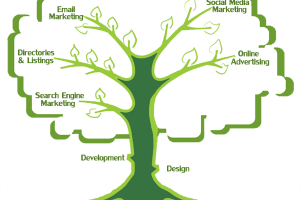A definition of marketing intelligence and the requirements of modern marketing intelligence solutions.

It has long been rumored that in marketing today unimaginable amounts of data are generated. To illustrate the following statistics are quoted: Google processes over 40,000 search queries every second. That’s 3.46 million searches a day and unimaginable 1.2 billion Google searches a year. Also, in the past two years as much data has been generated in the whole of human history like never before.
But the problem is not just that there is so much data in marketing. Marketing data is often distributed across many different tools and systems, often in isolation. In addition, the MarTech environment is extremely dynamic, with new technologies and applications coming to market and entering the marketing departments. When this issue is then transferred to multinationals with different lines of business and brands, it quickly becomes apparent what the challenge is. This is where Marketing Intelligence comes in. This discipline is primarily about giving marketing decision makers real insight and helping them make informed decisions. The fragmented data is automatically merged
With marketing intelligence, marketing departments can regain control and access, analyze and analyze all data, regardless of system boundaries, and use it daily for data-driven decision-making. Previously complex data integration, modeling, and insight processes can be largely automated with advanced marketing intelligence platforms. With the ability to spend most of their time analyzing the data rather than preparing the data, the marketing department is much easier to master its new mission, which is to become the growth engine of the company.
Definition “Marketing Intelligence”
Marketing Intelligence refers to the integrated process of merging all distributed marketing data, their standardization for the purpose of comprehensive data analysis and their evaluation on the basis of predefined parameters. This way, the success of marketing activities can be comprehensively calculated and the achievement of growth targets by channel, target market or customer segment becomes measurable.
Earlier, there were dedicated marketing intelligence platforms for this purpose, most of these tasks were outside of marketing. Partially conducted by external analysts, they primarily used rigid, self-contained BI (Business Intelligence) platforms. However, these had their problems with the inherent fast pace of marketing data, especially with the explosive growth of the MarTech applications used and the concomitant creation of new data silos in marketing.
Modern Marketing Intelligence
Modern marketing thrives on being able to act quickly. In order to do so, the data-based answers to all questions must be available at any time and, if possible, in real time at the touch of a button. Marketers need a single point of contact for all information and insights, so they can make an overall smart decision to optimize the customer journey. The prerequisite for this is the integration of all distributed data and the ability to merge the data within the central database so that they can be correlated and evaluated. In addition, the reference system must be flexible enough to integrate new data sources in minutes (rather than months).
The high complexity of the marketing data coupled with the need to react quickly made a smarter approach necessary. With Marketing Intelligence, it is marketing itself that has full responsibility for its own data, its evaluation, and the resulting decisions. Each marketing intelligence solution must, therefore, be able to fulfill the following requirements catalog:
- It must be a platform designed specifically for use in marketing to consolidate and unify all data so that marketers can act on a data-driven basis.
- The platform must be able to easily integrate all marketing, media, sales and customer data into one central reference database.
- The solution of your choice should be able to organize data automatically, eg by region, campaign, the advertising motif used, etc.
- Make sure that the solution gives you the opportunity to map your desired KPIs and metrics.
- Beyond the mere presentation of data, the solution should also support your decision making, promote collaboration within the marketing organization, and provide automation capabilities.
- Ultimately, you need to make sure the solution supports your departmental goals, optimizes campaign performance, maximizes advertising impact, fosters customer loyalty, and contributes to brand health.
- And it has to be agile enough to be able to map future innovations flexibly and to always answer new questions.
Marketing Intelligence aims to give control back to marketing. Technology is a means to that end and helps bring order to the jungle of marketing data. Advances in artificial intelligence (AI), machine learning, and technology embedded marketing expertise enable marketers to control all of their data. Data-based marketing is becoming as easy as that.
If a marketing intelligence solution meets the catalog of requirements described above, marketers can work in a new way: reporting, at any time at the touch of a button; Optimization, based on centralized, consistent KPIs that are used for any marketing decision; a central reference database for the SEO Manager as well as for the Marketing Data Analyst and the CMO.













Add Comment